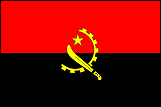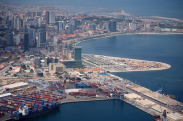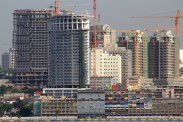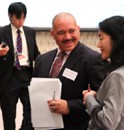アンゴラ共和国

関係先リンク
日本-アフリカビジネスフォーラム2014 ビジネスパートナーシップセミナー プレゼン資料 
(Dr. Maria Luísa Perdiga Abrantes, the Secretary of State and CEO of Angolan National Private Investment Agency (ANIP))
在京アンゴラ共和国大使館からの情報提供
Embassy of the Republic of Angola in Japan
アンゴラ共和国特命全権大使よりメッセージ
アフリカビジネス振興サポートネットワークのウェブサイトをご覧の皆様へ
初めに世界第三の経済大国日本に拠点を設け、アフリカ大陸の投資資源を稼動させるという根本的目的の達成を促進し、さらにミレニアム開発目標の達成実現を加速することに寄与しているアフリカ開発銀行に感謝します。
在日アフリカ大使館が其々の国の情報を掲載するウェブサイトを立ち上げるというこの企画は、日本の一般社会のみならず、アフリカの経済、政治、文化に携わるビジネス社会の方々にアフリカ大陸の魅力を伝えることが出来るでしょう。
日本とアフリカは双方の繁栄ある未来に向けて、より強固な関係の構築を目指しています。その一つがアフリカ開発会議プロセスであり、日本は、基本原則であるアフリカの「オーナーシップ (自助努力) 」と国際社会の「パートナーシップ (協調) 」に基づき、アフリカ開発の推進に向け、その取組みを国際的枠組みへと進化させるべく取り組んでいます。
当大使館は2013年、様々な取組みによりアンゴラの観光、ビジネス等、幅広い可能性について一般、そして企業の方々に紹介してまいりました。
このポータルサイトでは、歴史やビジネス環境を含むアンゴラの基本情報をご紹介しております。ご覧の皆様が、アンゴラや他アフリカ諸国の知識を高めるのに役立てて頂けることと期待しております。
【はじめに】
アフリカ南西沿岸部に位置する共和制国家。東にザンビア、南にナミビア、北にコンゴ民主共和国と国境を接し、西は大西洋に面している。
総国土面積は1,246,700㎢。首都ルアンダ(Luanda)市をはじめ、ベンゲラ、カビンダ、ロビト、マランジェ、ナミベ、ソヨなどの経済発展目覚ましい主要都市が存在する。
1,650㎞の海岸線上にはルアンダ、ナミベ、カビンダ、ロビトなど主要な港があり、特にロビト港からは1,344kmに及ぶベンゲラ鉄道がコンゴ民主共和国やザンビアまで繋がっている。
アンゴラの季節は雨期(8月中旬頃~5月中旬頃)と乾期(5月中旬頃~8月中旬頃)2つで構成される。地理的位置や地形上、沿岸部は年間平均気温が23度以上、内陸北部は降水量も気温も高く、南西部は低温で乾燥している。
そのため穀物、根菜、塊茎、園芸品、油料種子、コーヒー、綿、サトウキビなどを広大な範囲で栽培する格好の条件を備えている。
アンゴラは、石油、天然ガス、ダイアモンド、ウラン、鉛、金、鉄、リン酸エステル、マンガンなどの様々な鉱物資源にも恵まれている。
人口は約2,000万人で、その約半数がルアンダ近郊で生活している。公用語はポルトガル語だが、各部族の言語も広く使用されている。近年、諸外国語も通用するようになってきている。大半の国民がカトリック・キリスト教徒である。
【歴史概要】
1482年、ポルトガルがアンゴラに到達し、1575年にルアンダを建設した。 その後、スペインがポルトガルとその海外領土を支配したことに乗じたオランダにより1641 年から1648年までルアンダが占拠された。
そしてポルトガルに奪回された17世紀以降、ブラジルなどでサトウキビ畑の労働力として奴隷の供給地となった。ポルトガルは1836年に奴隷貿易を廃止したものの、植民地支配は続いた。
1950年代前半、母国解放を目指したアンゴラ人達は独立を求める民族主義運動を決起したが、宗主国が要求に同意しなかったことで、1961年に武装闘争が始まった。紛争の末、アンゴラは1975年11月に独立を勝ち取るも、直後に内戦が勃発し、2002年にようやく終焉を迎えた。
それ以降、アンゴラは平和で安定した状態を維持しており、過去10年間において世界で最も急成長を遂げた経済圏の仲間入りを果たしている。
【ビジネス環境】
アンゴラは南部アフリカ開発共同体(SADC)に加盟し,主要な役割を果たしている。過去14年にわたり、政府は、内戦期に破壊されたインフラの再建に向けた包括的なプログラムを実施してきた。
石油産業部門はアンゴラ経済の中核であり、大きな役割を担っている。しかし、不安定な国際原価格への対策として、資源依存からの脱却を図り、産業の多様化を推進。石油以外の食料、農産業、エネルギー、水、住宅、運輸、物流等の分野の活性化を目指している。
国際通貨基金(以下IMF)は、2014年の成長率を6.3%と推測している。100億USドルに値するソヨ(Soyo)に建設されたLNG工場では、天然ガス、プロパン、ブタンガスに加え、年間520万トンのLNGの収集、処理、供給が可能であるとされる。同工場では、2013年6月中旬にブラジルに向けてLNG第一便を輸出した。
さらに、IMFと世界銀行は、アンゴラの国内総生産(GDP)が2017年2,000億ドルに達すると予測しており、経済成長は引き続き堅調な見込みである。政府は、今後5年間の年間平均成長率を7.1%、そのうち石油部門では1.75%、非石油部門では9.5%の成長率を予測している。
アンゴラ政府は、投資家の積極的な参加を促し、経済発展をより刺激するため、2011年5月より新しい法的枠組みで民間投資法と、投資家に対する追加的な保護を提供するその他多くの法律を規定した。さらに、民間投資を保護する複数の国際的組織や協定にも加盟している。
アンゴラの民間投資法は、建築、工業、交通、農業、通信、電力および水力関連インフラなど様々な分野に優遇措置を提供している。さらに、雇用創出、技術移転への寄与と基本的インフラの近代化、輸出高増加および輸入依存縮小、国内製品への価値の付加などを実現するプロジェクトにはインセンティブが与えられている。
最後に
アンゴラが政治的、社会的に安定し10年以上が過ぎましたが、是非皆様にアンゴラを訪れ、直にアンゴラのおもてなしを体感して頂きたいと思います。また日本企業の皆様につきましては、効果的かつ友好的な民間投資環境、アンゴラの力強い機運と多くのビジネスチャンスを利用し、我が国を未来の投資先として検討していただきたく存じます。
ご質問等ございましたら、遠慮なく当館へご連絡ください。
The Message from the Ambassador of Angola
Dear visitors to the AB-NET website,
Allow me to start by showing my appreciation to the African Development Bank (ADB) for creating a representation office in the world’s third largest economy, something that will surely help the ADB to achieve one of its fundamental objectives, namely, the mobilization and allocation of resources for investments in the continent, which in turn will speed up the realization of the millennium goals.
I strongly believe that the ADB’s initiative to set up a website where African Diplomatic Missions in Japan can present information about their respective countries will bring the Japanese civil society as well as businessmen closer to the socioeconomic, political and cultural realities of the African continent in general and the characteristics of each country in this amazing continent.
Japan and Africa are working together aiming at building stronger links which will create a prosperous future for both parties. One of these links is the TICAD process through which Japan has been taking a leading role in mobilizing the international community for African Development under the concept of “ownership and partnership”.
For its part, the Embassy of the Republic of Angola in Tokyo carried out numerous projects in 2013 to introduce to the Japanese civil society as well as to the business community the vast potentialities of Angola in various sectors from tourism to business opportunities.
Here you will find some basic information about Angola which includes its history and the current business environment. I sincerely hope that all visitors to this website will find enough information to enhance their knowledge about Angola and other African countries as well.
Introduction
The Republic of Angola is located on the west coast of Southern Africa. It shares borders with the Republic of Congo and the Democratic Republic of Congo to the North and East, Zambia to the East, Namibia to the South and the Atlantic Ocean to the West. It’s territory covers 1.246.700㎢. Luanda is the capital city and other main cities are Benguela, Cabinda, Lobito, Malanje, Namibe and Soyo.
The country has a 1.650km coastline along which are located the main ports, namely, the ports of Luanda, Namibe, Cabinda and Lobito with the latter being connected to the 1.344km Benguela Railway which links the Democratic Republic of Congo and Zambia to the Atlantic coast of Angola.
Angola has two seasons, namely, the rainy hot season that goes from mid-August to mid-May and the dry season that goes from mid-May to mid-August.
Given its geographic location and landscape, Angola is divided into two distinct climatic regions. The Coastal Region with an annual average temperature above 23C and the Inland Region, subdivided into the Northern Zone with high rainfall and high temperatures and the Southwest Zone with dry weather and low temperatures, thus, having excellent conditions for large scale production of cereals, roots and tubers, horticulture, oilseeds, coffee, cotton, sugar cane, etc.
Angola is blessed with large quantities of mineral resources such as oil, natural gas, diamond, uranium, lead, gold, iron, phosphate, manganese, etc.
Angola has a population of about 20 million inhabitants with nearly 50% of the total population living in urban centers. The country’s official language is Portuguese but other national languages are also widely used. In recent years, the number of foreign language speakers has also increased. Most Angolans are Christians with Catholicism being the largest denomination.
Brief History
The Portuguese arrived in Angola in 1482 and found Luanda in 1575. Taking advantage of the occupation of Portugal and its overseas territories by Spain, the Dutch occupied from 1641 until 1648 when the Portuguese were able to retake Luanda from Dutch control.
From the 17th century onwards, Portugal had transformed Angola into an important source of slaves to work in sugar cane plantations in Brazil. Portugal abolished the slave trade in 1836 but maintained colonial rule over Angola.
Aspiring to free their country from Portuguese colonial rule, Angolans got together in the 1950s to create nationalist movements that called for independence. As the colonial power refused to accede to the demands of the nationalist movements an armed struggle for independence started in 1961. After some years of conflict, Angola achieved independence on November 11, 1975. However, soon thereafter, a civil war erupted which finally came to an end in 2002.
Angola has since enjoyed peace and stability, one of the factors which enabled the country to join the rank of the world’s fastest growing economies in the last decade. Angola has enjoyed two digit economic growth.
Business Environment
Angola is an important member of the Southern Africa Development Community (SADC). For the past fourteen years, the Angolan government has been implementing a comprehensive plan for rebuilding the country’s infrastructure which was destroyed during the civil war.
The oil sector still plays a significant role in the Angolan economy. However, the Angolan government is determined to reduce the economy’s dependence in the oil sector, considering not only so the volatility of oil prices in the international market but also the need to promote and diversify the national economic structure which in turn could lead to the development of other main clusters (food, agro-industry, energy and water, housing, transport, logistics, etc.).
The International Monetary Fund (IMF) predicts that Angola’s GDP will have a growth rate of 6.3% in 2014. The $10 billion liquefied natural gas (LNG) plant in Soyo which is estimated to gather, process and deliver 5.2 million tons of LNG per year in addition to natural, propane and butane gas, sent out its first LNG shipment in mid-June 2013 to Brazil.
Furthermore, the country’s economic growth is expected to remain robust with the IMF and World Bank forecasting the GDP to reach $200 billion in 2017. The Angolan government estimates for the next five years, an average annual growth of 7.1%, driven by the strong growth rate of the non-oil sector which is expected to grow 9.5% during the same period, against the 1.75% in the oil sector.
To boost the inflow of private investment, which is vital to the economic development of the country, the Angolan government enacted in May 2011 a new legal framework, the Private Investment Law, which grants equal incentives to investors, both domestic and foreign. Furthermore, the government has enacted other laws and regulations that provide additional protection to investors and Angola is a member of several international organizations and conventions on private investment protection.
The Private Invest Law provides generous tax incentives to investments in construction, manufacturing, transportation, agriculture, communications, water and power infrastructures, etc. Furthermore, incentives are also given to projects that create jobs, contribute to technology transfer and modernization of basic infrastructures, increase the volume of the countries exports and reduce its dependence on imports as well as add value to national products.
Finally, considering the political and social stability in Angola achieved more than 10 years ago, I would like to invite Japanese tourists to visit Angola and experience first-hand our Angolan hospitality.
Also, taking into account the beneficial and favorable environment in Angola for private investment, I would like to take this opportunity to appeal to Japanese businessmen and companies to take advantage of this excellent momentum and the many business opportunities in the country to consider Angola as a possible destination for their future investments.
The doors of the Embassy are always open for you. Please don’t hesitate to contact us for any enquires.
Thank you.



関連記事
-
- アフリカ開発銀行
- 2023/11/24
- 【ウェビナー】11月28日(火)アフリカ開発銀行 債務管理ウェビナー”Lessons on Sustainable Borrowing and Policy Implementation”
- アフリカ開発銀行は2023年11月28日(火)、債務に関するウェビナー・シリーズの第5回目として、ウェビナー「持続可能な借入と政策実施に関する教訓 ”Lessons […]
-
- JICA
- 2018/10/01
- 10月2日セミナー及びネットワーク・セッション「SADC諸国の開発金融機関(DFIs)と日本企業のパートナーシップの促進」
- JICAは、南部アフリカ開発銀行協会と連携して、SADC諸国より視察団の受け入れを計画しています。この機会に、セミナー及びネットワーク・セッションを開催いたします。
-
- JETRO
- 2017/02/09
- 第2回アフリカ起業支援勉強会
- アフリカでの事業展開を本格的に検討する日本人起業家を対象とした勉強会を実施します。講師にアフリカ出身のビジネスパーソンを迎え、参加者の事業計画に対する意見交換を行います。
-
- JETRO
- 2016/11/11
- 「アフリカ出身ビジネスパーソン活用セミナー」 「アフリカビジネスセミナー」 ~ 同日・同会場にて開催!~
- 12月2日(金)に、アフリカ関連イベントを同日・同会場にて開催します!
-
- 在京アフリカ各国大使館
- 2016/06/01
- 「SADC-Japan Business Investment Forum」南部アフリカ開発共同体地域におけるビジネス投資機会
- 申込み用紙の英語版を追加しました
-
- JETRO
- 2016/05/30
- 「~先行事例に学ぶ~対アフリカ戦略セミナー」のご案内
- 今夏ケニア・ナイロビでのTICADⅥ開催にあたり、にアフリカビジネスを先行しておこなってきた欧州企業や日本企業にご講演いただきます。今後アフリカでの事業展開の検討にお役立てください。
-
- JETRO
- 2016/03/22
- ジェトロ2016年度「アフリカビジネス実証事業」公募開始のお知らせ
- アフリカ諸国における拠点設立を目指した継続的なビジネスを検討する日本企業の皆様から事業企画を募集し、採択された案件について官民連携で実証を行います。
-
- JETRO
- 2016/03/09
- ジェトロ 「アフリカビジネス実証セミナー」のご案内
- ジェトロ・アフリカビジネス実証事業を活用された企業の方にご講演いただき、 本事業の活用方法と、アフリカビジネスにおいて直面するリスクやチャン スについてご紹介するセミナーを開催します。
-

- 毎日新聞社
- 2016/01/29
- 「南部アフリカ・フォーラム2016」2月19日開催/聴講者募集中
- 今年アフリカで開催される第6回アフリカ開発会議(TICAD6)を控え、経済成長著しい南部アフリカ地域と日本との協力関係を話し合う第7回南部アフリカ・フォーラムを開催します。 ―南部アフリカの現 […]
-
- AB-NET 運営事務局
- 2015/01/27
- 【開催のお知らせ】3月9日~11日 アンゴラ・ジャパン・ビジネスフォーラム 2015
- 2015年3月9日から11日に、駐日アンゴラ共和国大使館主催「アンゴラ・ジャパン・ビジネスフォーラム 2015」が、アンゴラ・ルアンダにて開催されます。

